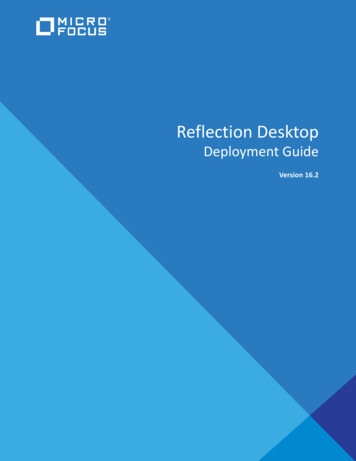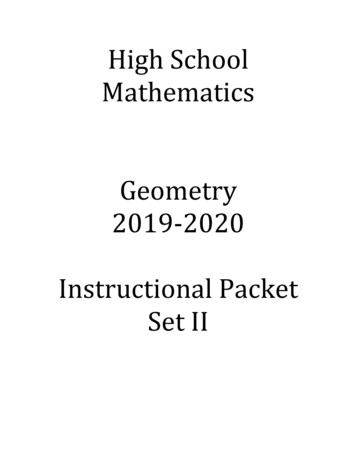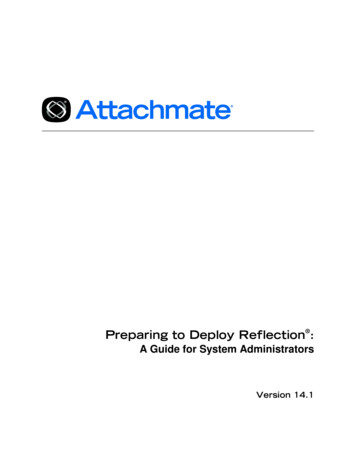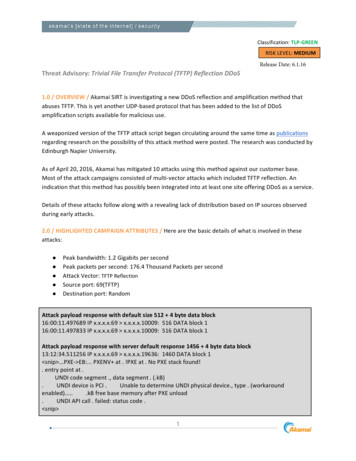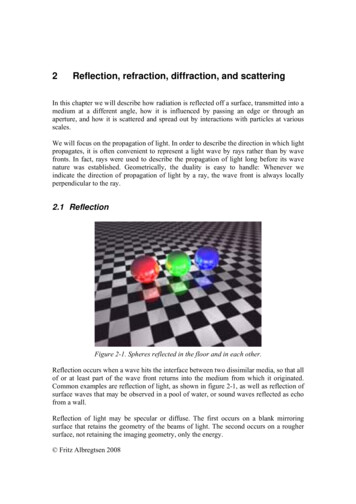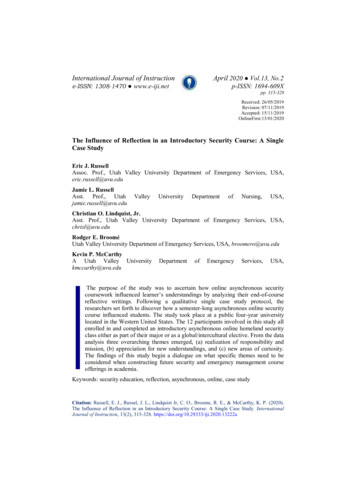
Transcription
International Journal of InstructionApril 2020 Vol.13, No.2e-ISSN: 1308-1470 www.e-iji.netp-ISSN: 1694-609Xpp. 315-328Received: 26/05/2019Revision: 07/11/2019Accepted: 15/11/2019OnlineFirst:13/01/2020The Influence of Reflection in an Introductory Security Course: A SingleCase StudyEric J. RussellAssoc. Prof., Utah Valley University Department of Emergency Services, USA,eric.russell@uvu.eduJamie L. RussellAsst. Prof., tofNursing,USA,Christian O. Lindquist, Jr.Asst. Prof., Utah Valley University Department of Emergency Services, USA,chrisl@uvu.eduRodger E. BrooméUtah Valley University Department of Emergency Services, USA, broomero@uvu.eduKevin P. McCarthyA Utah Valley rvices,USA,The purpose of the study was to ascertain how online asynchronous securitycoursework influenced learner’s understandings by analyzing their end-of-coursereflective writings. Following a qualitative single case study protocol, theresearchers set forth to discover how a semester-long asynchronous online securitycourse influenced students. The study took place at a public four-year universitylocated in the Western United States. The 12 participants involved in this study allenrolled in and completed an introductory asynchronous online homeland securityclass either as part of their major or as a global/intercultural elective. From the dataanalysis three overarching themes emerged, (a) realization of responsibility andmission, (b) appreciation for new understandings, and (c) new areas of curiosity.The findings of this study begin a dialogue on what specific themes need to beconsidered when constructing future security and emergency management courseofferings in academia.Keywords: security education, reflection, asynchronous, online, case studyCitation: Russell, E. J., Russel, J. L., Lindquist Jr, C. O., Broome, R. E., & McCarthy, K. P. (2020).The Influence of Reflection in an Introductory Security Course: A Single Case Study. InternationalJournal of Instruction, 13(2), 315-328. https://doi.org/10.29333/iji.2020.13222a
316The Influence of Reflection in an Introductory Security Course: INTRODUCTIONDiscovering the influence reflection had on students in a semester-long asynchronousonline security course was the focus of this qualitative single case study. The course isoffered as part of an emergency services administration bachelor’s program at aUniversity in the Western United States. The majority of learners taking this specificcourse are emergency services majors. However, in recent years the course has gainedpopularity with learners from other majors at the University who chose to enroll in theclass as a global/intercultural elective option.The central question guiding the study asks how an introductory asynchronous onlinesecurity class influenced students; specifically, what in their own reflective writingswere some “eureka” moments and takeaways from the coursework. To conduct thestudy, the researchers used the participants end-of-course reflections to glean anunderstanding of the influence the coursework had on the learners. The study focuses onreflection because past research has shown the reflective process to be where growth inunderstanding occurs (Mezirow, 1990; Moon, 1999). The participants in the study wereall juniors and seniors majoring in different undergraduate disciplines. Individualstaking this specific course who were not emergency services majors, opted to take thecourse as an upper-division global/intercultural engagement elective from a list of 64individual university catalog global/intercultural classes.The specific course used in this research project explored current issues regardingsecurity at the international, national, regional, state and local levels including globalhistory and evolution of security, particularly as they relate to terrorism, disasters, andprotections of peoples and infrastructure. In addition, the course introduced howinternational and national security topics impact state and local public safety agencies.Throughout the course, learners engaged in discussions pertaining to security,constructed briefings involving different nations as they relate to security, read multiplehistorical and contemporary security articles, completed reading quizzes, and finishedthe course with a final exam as well as a comprehensive reflective assignment on theoverall experience.Currently, there are over 300 universities throughout the United States offeringundergraduate and graduate courses, certificate programs, degree programs in dozens ofdifferent areas within the security and emergency management framework (FEMA,2018). Though these degrees may focus on particular areas within security and disastermanagement, they all seem to offer introductory and fundamental courses. Therefore,understanding the influence such introductory courses have on learners seems to be aneed within security academia. Specifically, as Mezirow, (1990) argued, changes indeeper meaning and understanding occur can be seen in the reflective process; therefore,a need exists to focus on, and make meaning of, the results of a learner’s reflection. Inparticular, because certain introductory classes can influence those choosing to take acourse simply as an elective, into changing their major because of how interesting andimpactful the learning experience (Hoisch & Bowie, 2010).International Journal of Instruction, April 2020 Vol.13, No.2
Russell, Russel, Lindquist Jr, Broome & McCarthy317LITERATURE REVIEWSecurity and disaster education in the United States primarily focuses on the all hazardresponse aspects associated with the United States Department of Homeland Security(DHS). DHS itself is a large bureaucracy that spans dozens of agencies and operationsranging from law enforcement, protection services, and emergency response tocounterfeiting and human trafficking (Borja, 2008). For example, under the purview ofDHS exists agencies such as the United States Coast Guard, the United States SecretService, and the National Fire Administration. The conceptual idea of DHS was tocreate a department within the United States Federal Government that could encompassan all-hazard protection model. Thus, it became a single entity that could directly planfor, respond to, and recovery from any natural and human caused disasters. The visionfor DHS was to transcend the outdated and cumbersome United States civil-defensemodel of the Cold War Era (Borja, 2008).Empirical works that identify the need to understand how homeland security courseofferings influenced university students formed this literature review. A noteworthydiscovery in the literature was the impact emergency and security curricula andeducation had on students (Russell & Fisher, 2014). The literature review begins with anoverview of introductory courses within academia. Then the review offers a delineationof security education. The review then continues by offering a snapshot on the use ofreflection in education, so as to tie into this study’s use of end-of-course reflections inorder to gain a better understanding of the influence the coursework had on participants.Introductory CoursesThe purpose of introductory courses within academic majors is to establish a basicunderstanding of a particular subject (Chesley et al., 2018; Goodyear, 2015). Aproperly designed introductory course incorporates the subject-matter that grounds aparticular area of study in a way that sparks curiosity and a desire to know more(Goodyear, 2015; Gurung et al., 2016). This is also the case for non-academic majorsseeking out interesting electives and general education opportunities (Gurung et al.,2016). Stimulating introductory courses can influence recruitment of students byinspiring them to change their major by introducing new theories and areas ofknowledge (Hoisch & Bowie, 2010).Well-constructed introductory courses contribute to student success by providing a basicfoundation of understanding on which to build upon (O’Neill & Noonan, 2011).Introductory coursework needs to spark critical thinking and reflection on the subjectmatter (Burbach, Matkin, & Fritz, 2004; Young & Warren, 2011). As Schön (1987)argued, it is in the reflective process, where the learner thinks about thinking, that adeeper understanding and retention occurs.Introductory courses within specific academic majors should share basic characteristicsand subject matter across academic institutions. For example, an introductory course inpsychology would include coursework on Wilhelm Wundt or in Peter Drucker inmanagement. However, for introductory courses in homeland security there are stilldisagreements as to what subjects constitute the academic major (Bellavita & Gordon,2006).International Journal of Instruction, April 2020 Vol.13, No.2
318The Influence of Reflection in an Introductory Security Course: Security EducationSince the inception of modern security, both practitioners and academics have struggledto define what it is (Bellavita, 2008; Noftsinger, Newbold, & Wheeler, 2007). Thoughthis lack of a specific definition may seem like a problem to some, to others withinacademia it is an opportunity to approach the subject matter from different perspectives(Caruson & MacManus, 2006). For instance, some institutions may choose to focusareas such as legal framework and constitutional issues, others terrorism or lawenforcement, and for some, emergency response or cyber security (Bullock, Haddow, &Coppola, 2011). Regardless of where one eventually decides to focus, two things seemto always need addressing: (a) the historical evolution of security, and (b) the role thatthe security bureaucratic apparatus plays within society. These two areas are commonwithin introductory security courses throughout higher education (Comiskey, 2015).According to the National Research Council (2005), there is a need to offer securityfocused courses throughout all disciplines and majors. The claim of the NationalResearch Council (2005) seemingly creates a gap that needs to be addressed,particularly, a need for academia to understand how such security course offeringsinfluences learners (Drabek, 2009; Russell & Fisher, 2014). Drabek (2009) argued thatstudying security and disaster management increased broad societal resilience in the faceof tragedy.The research of Russell and Fisher (2014), discovered that students who attended asemester-long security class reflected that there was an “importance of homelandsecurity education” (p. 23). This study builds upon the work of Russell and Fisher(2014) in order to discover why the field of study is viewed as important byunderstanding the specific influences the coursework had on students. Gleaning such anunderstanding of these influences holds possibilities for strengthening introductorysecurity course offerings throughout academia.The works of Drabek (2009), as well as Russell and Fisher (2014) suggest there is aneed for academia to better understand how security coursework influences learners.Meaning, what are learners taking away from their studies beyond a grade. The works ofDrabek (2009) as well as Russell and Fisher (2014), seem to reveal why studying local,national, and international security is important; however, there is still a need tounderstand how specific courses influence the understanding of undergraduate learners.Looking at the reflective works of learners that attend such security classes creates apathway for understanding the influence of the coursework.Reflection in EducationAn avenue for strengthening a learner’s ability to retain information is through the use ofreflection (Dewey, 1938/2007). The reflective process gives the learner what Dewey(1938/2007) refers to as a secondary experience of one’s learning. Therefore, it seemsrefection can improve the learner’s understanding of homeland security coursework.Moreover, reflection has the potential to transform the way learners retain informationbeyond the classroom (Mezirow, 1990).International Journal of Instruction, April 2020 Vol.13, No.2
Russell, Russel, Lindquist Jr, Broome & McCarthy319According to Pelfrey & Kelley (2011), security education’s greatest attribute isequipping students with the ability to execute multifaceted, cognitive assignments. Oneway to accomplish this is through the use of reflection (Kiltz, 2009). Kiltz (2009) arguesthat reflection is a part of developing a learner’s ability to think critically and makedecisions. Thus, academia can strengthen a learner’s critical thinking skills in partthrough the use of reflective assignments (Szenes, Tilakaratna, & Maton, 2015).At present, many students enrolled in university level security courses are practitionersin their field. As it is with other academic disciplines, adult learners have differentexpectations than the traditional learner and are identified as non-traditional students(Hughes, 1983). Russell and Fisher (2014) assert that when teaching these nontraditional students that are practitioners in security and emergency services career fieldssuch as law enforcement, fire-rescue, and emergency medical services, it becomesnecessary to follow adult-learning models. Course content and assessment associatedwith non-traditional learning needs to bridge academics with the practitionerexperiences (Goldberg, 2012). Maxfield and Fisher (2012) posit that reflection andjournaling are critical to the success of the non-traditional student, allowing thepractitioner to ponder the coursework while linking it to their profession. Additionally,Maxfield and Fisher (2012) established that the traditional student relates their learningto future possibilities, while the non-traditional student relates experiences to learning.When looking at an individual’s thoughts and actions, a metacognitive process connectsboth thought and action, which must be reconciled prior to progressing and fosteringadditional thought and action. Kemmis (1985) stressed that reflection is both an innerprocess that looks at the person's thoughts as well as an outer process that looks at thesituation. Moon’s (1999) argument was that the highest level of deep learning is definedas one’s ability to attain meaningful reflection. The work of Maxfield and Fisher (2012)advanced the position of reflection to argue that affective learning has been linked tolearning and understanding at higher levels.A review of the literature on reflection types offers the differences between single-loopreflection and double-loop reflection. Brockbank and McGill (1998) suggest single-loopreflection is centered on tasks and design of the process. Courtney, Croasdell, andParaadice (1998) posit a single-loop is a lower level of reflection, because it is based onkeeping rules and error correction. Courtney et al. (1998) described the double-loopreflection as a higher level versus the single-loop reflection because it focuses on theevaluation of the experience and the possible variations of the experience [emphasisadded]. In addition, Goldberg (2012) suggests “reflective learning can be a valuableteaching practice in homeland security and emergency management programs wherethere is also a strong connection between experiential learning (practitioner experiences)and course learning objectives” (p. 68). Therefore, particularly for non-traditionallearners that are professionally affiliated, it seems important to provide a venue for themto reflectively synthesize their course takeaways with their real-world experiences.These reflections seem to offer academia a pathway for understanding the influence suchcourses have on learners.International Journal of Instruction, April 2020 Vol.13, No.2
320The Influence of Reflection in an Introductory Security Course: METHODThe study setting took place at state university located in the Western United States. Theresearchers employed a single case study qualitative design to conduct the study(Kennedy, 1979; Seawright & Gerring, 2008; Yin, 2018). The population used in thisstudy consisted of n 12 undergraduate students; see Table 1. The participants were alljuniors and seniors, with 8 identifying as male and 4 identifying as female. To protectthe anonymity of the participants, the only demographic information disclosed isAcademic Year, Academic Major, and Gender Identity.Table 1The Participants of the StudyParticipantParticipant 1Participant 2Participant 3Participant 4Participant 5Participant 6Participant 7Participant 8Participant 9Participant 10Participant 11Participant 12Academic orJuniorJuniorJuniorSeniorAcademic MajorEmergency ServicesEmergency ServicesBiologyPolitical ScienceEmergency ServicesBiologyCriminal JusticeEmergency ServicesCriminal JusticeBiologyCriminal JusticeBiologyGender MaleMaleFemaleSamplingThe researchers used a type of purposive sampling known as theoretical sampling(Corbin & Strauss, 2008; Patton, 2002). The justification for using the purposivetheoretical sampling process is that it allowed for theoretical discovery involving datacollection and analysis from a pre-selected specific group (Patton, 2002). Theresearchers chose to use theoretical sampling because this particular study focused on apre-selected course made up of specific learners. The course consisted of n 57students. The researchers relied on data saturation to determine the study’s sample size(Fusch & Ness, 2015; Mason, 2010). Saturation, as it pertains to qualitative research,involves data collection and analysis to a point where nothing new emerges (Fusch &Ness, 2015; Mason, 2010). Saturation occurred in the data analysis with n 12participants.Data CollectionData collection consisted of multiple end-of-course reflective writing assignmentsobtained from students that took part in the online security course. Data retrieval timetook less than one day. Prior to conducting the research, the researchers obtainedpermission from their University Institutional Review Board to proceed with thisresearch study. To protect the study participants, the researchers removed any personalidentifiers. The researchers followed a specific, systematic case study approach toInternational Journal of Instruction, April 2020 Vol.13, No.2
Russell, Russel, Lindquist Jr, Broome & McCarthy321collect and analyze the data, as well as establishing a secure database for data collectionand storage to ensure data reliability (Patton, 2002; Yin, 2018).Data AnalysisTo construct the case study, the researchers used a pattern matching analytic techniquebased upon the writings of the study’s participants (Yin, 2018). As mentioned earlier,protection and anonymity of the study participants was paramount. To confirm validity,the researchers triangulated data sources from multiple participants, had anotherresearcher conduct an analysis for comparison and present the data in descriptive tablesin the results section. To ensure data reliability, the researchers followed specific casestudy protocols and established a secure database for data storage (Yin, 2018).To analyze the data the researchers developed case descriptions utilizing a systematic,hierarchical approach (Stake, 1995; Yin, 2018). The data analysis began with theresearchers organizing and preparing the data for analysis, removing any personalidentifiers of each of the participants to protect their anonymity and then reading thetranscribed questionnaires to become familiar with the data. Each participant wasassigned a “P” and then a corresponding number. To analyze the data the researchersused a hand-coding process that involved color-coding the data (Basit, 2003). The handcoding process allowed researchers to spend more time reading and rereading the data,color-coding different attributes and compiling notes and common themes based on theparticipants writings (Basit, 2003; Corbin & Strauss, 2008). Using inductive reasoning,propositions were generated from the findings and reported in the discussion (Coyne,1984; Kennedy, 1979; Yin, 2018). To present the findings in the results section theresearchers developed narrative case descriptions, in table form, based upon theemergent themes in order to display and interpret the findings (Kennedy, 1979; Yin,2018).FINDINGSThe results of the data analysis converged to answer the central question guiding thisresearch. As noted in the introduction of this article, the question asked how anintroductory online security course influenced students? The reflective assignment thatwas used to conduct this study was an end-of-course open ended writing assignment.The specific assignment asked learners to write of their experiences throughout thecourse, addressing any “eureka” moments, takeaways, interest in subject matter, andmemorable reflections. Emerging from a data analysis of the writings were 3 themes, (1)Realization of Responsibility and Mission, (2) Appreciation for New Understandings,and (3) Areas of Curiosity. The following tables present the themes and correspondingattributes in the words of the participants; see Tables 2, 3, and 4.International Journal of Instruction, April 2020 Vol.13, No.2
322The Influence of Reflection in an Introductory Security Course: Table 2Realization of Responsibility and MissionParticipant AttributeP1“I have a better understanding of how current and even past issues and events”P2“I have come to realize that homeland security is so much more than terroristattacks by violent extremist groups.P3“I have gained a new respect for everyone behind the Department of HomelandSecurity”P4“I seem to have a better understanding of bureaucracy in government.”P5“I have gained a respect for the organizations that fall under the Department ofHomeland Security”P6"I have come to understand that homeland security is more complicated than mostpeople initially think”P7"My impression of the responsibilities of Homeland Security prior to this class wasconsiderably narrower than what they are actually responsible for”P8"When I started this course, I had no idea that there were so many branches that fellunder the department"P9“Before taking this class, my knowledge of homeland security was superficial”P10“I realize how ignorant I was to what the government does to protect the citizens”P11"I was simply unaware of all the agencies involved in homeland security”P12"Homeland security is bigger than I thought it was”Table 3Appreciation for New 12Attribute“I have a better understanding of how our government and homeland securityworks and why it was created”“I have a newfound desire to know more about homeland security policies andpractices”“This class opened my eyes to just how much danger there really is in the world”“This course pointed out how complacent or very casual viewpoint I had developregarding government operations”“I now understand that there is a background to each decision, and that eachthreat has been carefully thought out by those who do their best to protect us”"To me, homeland security is a big deal. To protect our country as a whole itrequires all departments to work together”"Until now I had no idea about of Homeland Security”"I now have a better understanding that it’s the responsibility not only of thegovernment, but of every citizen, to keep the homeland safe"“I have this new appreciation for the complex system of our country’s homelandsecurity, and how it has grown by leaps and bounds”“I feel that I have become so much more aware of the lengths that thegovernment goes to in order to keep people safe”“It is much clearer to me that we are in a constant struggle to better our nation’ssecurity from threats”“I feel more educated in regard to foreign affairs and the relationship of the USwith the rest of the world”International Journal of Instruction, April 2020 Vol.13, No.2
Russell, Russel, Lindquist Jr, Broome & McCarthy323Table 4Areas of ribute“What interests me the most about homeland security would be terrorismpreparedness and natural disaster response”“One area that interests me is our border patrol”“The area of homeland security that interest me the most is TSA”“I find the controversy of border protection interesting”“I think the concept that interests me the most is protecting the American peoplefrom terrorist threats”"The area of Homeland Security that interests me the most is Immigration andCustoms Enforcement”"I think the part of Homeland Security that is the most interesting is Immigrationand Border Control because of all of the controversy”"I am fascinated by FEMA"“The area of homeland security that interests me the most is that of the UnitedStates Coast Guard”“Learning about the Coast Guard was something that I found very interesting”“I really enjoy cyber security because we are under constant threat incyberspace”“The area of homeland security that interests me most is the prevention, andstrategy the US has against terrorism”DISCUSSIONThe learners drew deeper connections for themselves between their previously heldperspectives on homeland security, the presented course content and synthesized a richerunderstanding of the topic. For instance, P4 stated “I wonder why we can’t approachthings like homeland security with a common goal and understating" (P4). In thisinstance, P4 is going beyond the coursework and thinking about the common needs ofsociety. Another example was P3, who noted that homeland security is “essential to thelives of each person in this country" (P3). Again, as it was with P4, the learner wentbeyond the specific coursework and reflected on the needs of society.As in any intellectual exploration, the learners had many explicit and tacit questionsanswered by the curriculum which also evoked new thoughts such as P11 stating, “I alsofeel a little more protected, and also a little less protected because my eyes were openedto the strengths and weaknesses of our countries security" (P11). This qualitative casestudy was able to provide insights regarding learners’ takeaways, which were quitesubstantial and meaningful.Realization of Responsibility and MissionThe students describe their pre-course narrow perspectives of the topic to contrast theirend-of-course broadened views. For example, P12 stated “Homeland security is biggerthan I thought it was” (P12). The breadth and scope of the DHS was initially seen as afaceless government bureaucracy. Through the class, many came to see the DHS as acomplex governmental agency charged with a substantial responsibility and involving awide span of disciplinary expertise. For instance, P5 wrote, “All of the organizationsthat fall under the Department of Homeland Security are just people doing their jobs”International Journal of Instruction, April 2020 Vol.13, No.2
324The Influence of Reflection in an Introductory Security Course: (P5). On the other hand, as P11 noted, “I was simply unaware of all the agenciesinvolved in homeland security. I thought it was a bunch of guys in a large room sittingaround looking security cameras” (P11).It needs mentioning, that one might initially read the DHS mission of “all hazards”protection without really understanding the context of “all” being used (Noftsinger et al.,2007). In addition, as many participants noted, before the course, they understood therole of homeland security to be part of the Department of Defense mission. For example,as P7 stated, “I think I confused them most of my life with the Department of Defense asfar as the military aspect of it, while Homeland Security is more civilian based" (P7).Many of the participants reflected on DHS being an umbrella covering manyorganizations and responsibilities, such as P2 who noted, “It’s different organizationswithin the homeland security umbrella that help to keep us safe on so many levels" (P2).The realization of the magnitude of DHS’s responsibility and mission was expressed inthe writings of the participants, who referenced roles such as TSA agents to cybersecurity experts. Moreover, the role of immigration policy and enforcement seemedmore complex than the learners’ understanding at the beginning of the course.Realization was synthesized through reflection, which focused the learners toward theevaluation of their experiences and the possible variations of the experiences (Courtneyet al., 1998). However, this reflection occurred across time when the learners comparedthe experiential variation of past and present engagement with the issues associated withthe course.Appreciation for New UnderstandingsIn all levels of education, the affective domain of learning is the most difficult to assessand evaluated (Dufner, Arslan, Hagemeyer, Schönbrodt, & Denissen, 2015). The subjectmatter of homeland security proved to be significantly more complex and wide-reachingthan the learners initially believed. Qualitative inquiry allowed us to “see” how and whythe reflection processes engages people’s affect (Courtney et al., 1998; Maxfield, &Fisher, 2012; Van Manen, 2018). The engagement in affect could not be easilymeasured, but it was qualitatively expressed by learners to facilitate a relatively stablechange in attitudes and beliefs about various homeland security issues. For example, P1wrote, “we should find smarter ways to stop crime” (P1), P6 reflected “HomelandSecurity just seems crucial to me" (P6), and P11 noted “It is much clearer to me that weare in a constant struggle to better our nation’s security” (P11).New Areas of CuriosityComplex social and political issues seem to have never-ending problems to be addressedand evolve ahead of our ability to solve them. As mentioned above, wisdom is gainedthrough in-depth study and reflection. For example, issues like immigration, cyberattacks, and globalism led learners to become concerned on a broader social, politicaland existential framework. For
chrisl@uvu.edu Rodger E. Broomé Utah Valley University Department of Emergency Services, USA, broomero@uvu.edu Kevin P. McCarthy A Utah Valley University Department of Emergency Services, USA, kmccarthy@uvu.edu The purpose of the study was to ascertain how online asynchronous security



